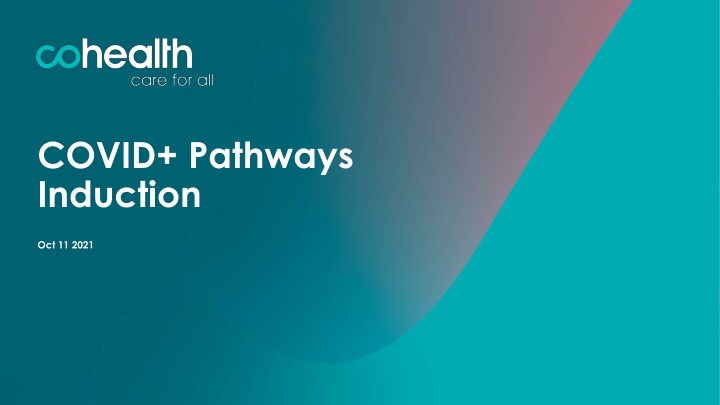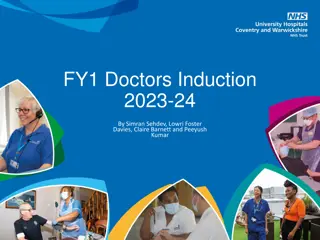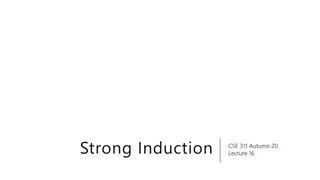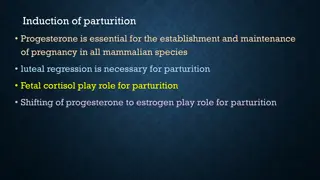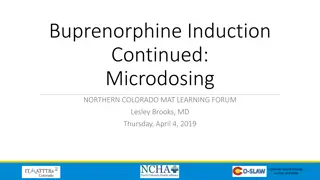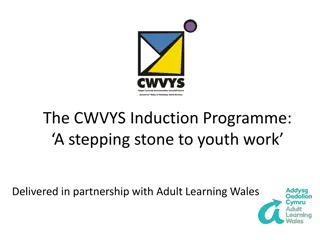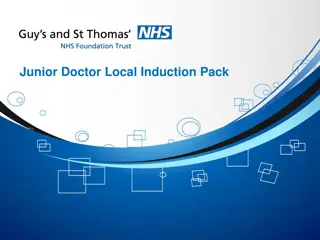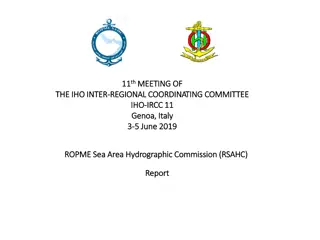Cohealth COVID+ Pathways Induction Program Overview 11th Oct 2021
This program overview introduces the COVID+ Pathways Induction on October 11, 2021, designed to navigate COVID+ patients to the right care pathway for safe quarantine at home. Cohealth, in partnership with various healthcare providers, aims to lead the assessment and triage of COVID+ patients, streamlining them into appropriate care settings based on risk levels. The program emphasizes roles, responsibilities, and the core mission of promoting community-based support for healthy communities.
Download Presentation

Please find below an Image/Link to download the presentation.
The content on the website is provided AS IS for your information and personal use only. It may not be sold, licensed, or shared on other websites without obtaining consent from the author.If you encounter any issues during the download, it is possible that the publisher has removed the file from their server.
You are allowed to download the files provided on this website for personal or commercial use, subject to the condition that they are used lawfully. All files are the property of their respective owners.
The content on the website is provided AS IS for your information and personal use only. It may not be sold, licensed, or shared on other websites without obtaining consent from the author.
E N D
Presentation Transcript
COVID+ Pathways Induction Oct 11 2021
agenda 10.30 11.30 Welcome and introduction to cohealth, program purpose/overview. Risk stratification and streaming pathways. Role requirements. 11.30 1 REDCap System) training and Q and A 1.00-1.30 Case studies
welcome to cohealth We are excited to have you join this hub program Your role is providing community based support for COVID+ patients and streaming them into the right care pathway Your role is very important
Vision Health communities, healthy people Mission Improve health and wellbeing for all and tackle inequality, in partnership with people and the communities they live in Values We care about the whole person and place people at the centre of everything we do, through; Inquiry and innovation: we are curious and inquisitive and think outside of the box; research and evidence underpin our work. Respect: we treat people with dignity and respect. Courage: we are focused on doing our best, trying new things and speaking up for what is right, without fear or favour. Social equity: we are committed to fairness and equality, making sure rights are foremost in our thoughts and actions, and making sure no one is left behind. Trust: We trust each other our knowledge, skills, experiences and motivations.
learning objectives 1. Understand your role 2. Understand the care model 3. Where you can find information and tools 4. Feedback and mechanisms
purpose Navigate COVID+ people to the right pathway of care based on assessment Decrease the spread of COVID+, by supporting people to quarantine at home (or other settings as appropriate) Make it safe for the patient to stay at home
in a nutshell This program is a partnership with Northwestern PHN, Public health units, primary health care and DHHS, healthcare partners are Western Health (Footscray & Sunshine), Werribee Mercy, Melbourne Health and Djerriwarrh Health services (who provide either inpatient care or virtual/hospital in the home care). cohealth will lead the assessment of all COVID + patients in our catchment, streaming low, medium and high risk patients into the appropriate care setting as required. Operating from 9.00am to 5.00pm, seven days a week from cohealth sites, with some of the team working remotely. To clear the backlog of calls required this program will function 8 AM 9 PM
COVID-19 Care Pathway The aim of the COVID-19 Care Pathway is to improve patient outcomes by; Providing early assessment and intervention for COVID-19 positive patients. Utilising agreed escalation criteria for referral to specialist care. Ensuring social welfare needs are assessed and streamed to the appropriate pathway according to need. Does not include people in residential care, hotel quarantine or already in care of a health service.
COVID+ care Health Information Principles 1. We must protect health information, ensuring that only authorised people can access it. Only discuss client information with your cohealth colleagues to carry out your role Do not share any information with others without the consent of the client. Overview Client search 2. Always search for a client in the client management system before registering them as a new client. Many people do not remember that they have previously been to cohealth and already have a record of care and treatment with us. Every cohealth client is allocated a Unique Record number (UR number) and this is used in each system to identify that client. 3. Three identifiers (name, date of birth, gender, sex at birth, address, Medicare number) must match or there is a risk that the incorrect client record will be used. If two clients have the same name but different dates of birth they must be treated as separate clients. Client duplicates 4. Client progress notes There should be a progress note recorded for every client interaction, as evidence of what happened. Other cohealth staff may need to refer to this or records could be required in court
COVID+ Care Pathways Care Connectors Contact clients for initial clinical assessment. Stream into appropriate clinical care pathway. Send GP or HITH referral letters Complete social welfare assessment and risk. Handle immediate issues i.e. food or meds. Stream to Care Navigator for more complex welfare needs. Care Navigator Complete any additional social welfare assessment and identity risk. Coordinate appropriate services and monitor throughout isolation period Phone support Answer 5551 calls Clarify process Assist when possible Escalate medical issues to GP/000 CSO GP and GP Liaison Contact clients for additional clinical assessment and streaming into Medium or High risk care Handle intake and telephone inquiries. Coordinate Runners for immediate, low level social welfare needs.
care pathways If the patient is rated as a high clinical risk and being streamed into hospital then you do not need to undertake a social assessment. If rated as a low or medium clinical risk then undertake a social assessment.
COVID+ Pathways Screening Assessment RedCap and assessment details Test details Isolation advice Medicare eligibility referral option if no GP referral option if no COVID symptoms Significant comorbidities Disability individual or family Medication Clinical concerns Pregnancy and breastfeeding Household Accommodation Pets Financial/employment Income Legal status Food security/nutrition Mental health Alcohol/drugs Safety
COVID+ Pathways Screening Assessment Clinical criteria for consideration: Must be before day 5 onset of symptoms Diabetes (requiring medication) Obesity (BMI > 30 kg/m2) Chronic kidney disease (i.e. eGFR < 60 by MDRD) Congestive hear failure (NYHA class II or greater) Chronic Obstructive Pulmonary Disease (history of chronic brhonchitis, COLD or emphysema with dyspnoea on physical exertion) Moderate to severe asthma (requiring an inhaled steroid to control symptoms or prescribed course of oral steroid in last 12 months)
case study Dimitra is a 70-year-old woman from Keilor East who speaks Greek and has been contacted already by DHHS that she is positive to coronavirus. Dimitra is supported by her husband Theo who is her carer and has also tested positive to coronavirus. Both Dimitra and Theo have significant mobility issues and rely on extended family to further support their needs namely their son Alec. Dimitra is very confused about her diagnosis and as she speaks little English, she mainly receives her information about coronavirus through Greek TV programs and family. He also explains that she has early onset dementia. Dimitra has a significant medical history, but she relies upon Theo giving her, her medications. Theo reports Dimitra s medical conditions include diabetes, stroke, high cholesterol, high blood pressure, rheumatoid arthritis, breast cancer and glaucoma. Dimitra has had a terrible cough and since falling ill has been unable to walk around the house without support. As Theo also has coronavirus and is 74 years he is feeling extremely anxious as he is unable to support Dimitra on his own and manage his own health. Theo is relatively healthy with his medical problems being arthritis and high blood pressure. Since his diagnosis he has felt extremely tired. He worries that they may die from coronavirus as some of his friends have passed away who where located in the local aged care centre. Both Dimitra and Theo are seen by the local GP which they have seen for the past 20 years. They have contacted their GP who is happy to help them over the phone but does not feel confident in managing them for coronavirus.
Tools and process GP referral template HITH referral template Care Navigator referral template Escalate situations/issues to your Team Leader. We will improve processes, develop resources or clarify information depending on escalations
GP referral template COVID + Pathway Response Team: GP Handover Information for the attention of Dr. Dear Doctor, Thank you for your continued care of the above-named patient who has been identified as appropriate for ongoing GP care in the community and has nominated you as their regular GP. Please find details of the assessment performed by our care connectors below. Social Assessment We have done a brief social assessment if you identify further issues please contact us Assessment Outcome Low Risk Pathway Referred to GP for ongoing care Please see supporting information from PHN and complete the REDCap surveys which will be emailed to you Patient has been consented for email notification of GP: Yes/No COVID+ Pathway Response Team: 9448 5551 Covid GP: 9448 5717 For GP enquiries regarding the North West Melbourne (NWM) Covidpos+ Pathways Model, phone 9347 1188 or email covid@nwmphn.org.au Client name: REDCap number: cohealth ur: DOB (Age): Gender: Address: Phone: Preferred language: Interpreter required? Symptom onset date: Test date: Medicare Number: Reference number: Exp date: Emergency contact: Symptom summary: Additional notes: Number: Relationship:
Hospital handover template COVID + Pathway Response Team: Hospital Handover Patient Details for cohealth UR Number Patient Name: DOB: Age: Patient Gender: Country of Birth: Needs interpreter: Preferred Language: Phone Number(s): Address: Next of Kin name: Next of Kin mobile number: Next of Kin relationship: Dear colleagues Thank you for your continued care of the above-named patient who has been identified as Medium risk in the COVID+ care pathway. One of our Covid Care Connectors has been in contact with you to discuss and confirm this referral. Please refer to our cohealth risk assessment (below) performed by our care connectors. It will include result dates and details including relevant risk factors. Clinical Assessment Symptoms: Social Assessment Please contact the Cohealth COVID+ Pathway Response Team if you have any further enquiries: 9448 5551
Pathways contact list coHealth Team leader phone (clinicians only): 0499 310 738 Intake/Support needs: 9448 5551 GP: 9448 5717 CovidCareTL@cohealth.com.au Call RMH Switchboard 9342 7000 and ask for the COVID Registrar Second contact COVID Consultant on-call 9342 7009 Referrals: 0429 025 511 Email: hith@djhs.org.au Referrals and clinical handover: 0408 462 284 Email referral: covidnotification@mercy.com.au Manager Susana Helle: 0410 562 269 Triage / Acute Coordinator: 0466 868 986 Internal RMH referral via EPIC RMH HITH Registrar via RMH Switchboard: 9342 7000 Email: RmhHithCoordinators@mh.org.au Mobile: 0447 903 049 Email: MH-COVIDVirtualward@mh.org.au 09:00- 18:00 Handover all referrals to Co-Ordinator :0478951547 (including pregnancy referrals) Email referral to WHCovid-19PositiveCarePathways@wh.org.au Please ensure all client referred into western HITH are provided with their client number 1300229656. Clients can call if they have questions about their clinical care. During business hours 7 days per week call 0478 951 547 From 1700 0730 7 days per week call 1300 229 656 9347 1188 covid@nwmphn.org.au Weekends - Janelle Devereux: 0452 218 492 8345 4043 Availability: 8.00am 8.00pm 7 days a week Medical Lead on call: 0435 024 754 WPHU@wh.org.au Available 9am - 5pm 7 days RMH COVID Clinician (VIDS registrar) RMH ED Admitting Officer Bacchus Marsh HiTH (Takes all adult non-pregnant patients) Mercy Health HiTH (Takes all adult non-pregnant patients) RMH@Home Acute /HiTH (Takes all adult patients including pregnant women) RMH Home Monitoring 8:30 5pm 7 days Western Health HiTH (For COVID positive pregnant women only) Western@Home COVID monitoring NWPHN WPHU
REDCap/system training Live training session
case study Kofi is a 34-year-old Ethiopian male who has recently been informed that he is covid positive. Kofi is currently staying at his brother s flat located within a housing complex in Flemington. His brother has a wife and 4 children, so Kofi mainly sleeps on the couch in the living room after losing his accommodation several weeks ago due to the landlord selling the house, he was staying in. Kofi currently has no employment and is supported through Centrelink payments and the occasional cash in hand job. Kofi has no significant medical history and only took a coronavirus test as he had a slight headache. Kofi has continued to help amongst the community as he feels fine and thought the headache was due to stress. He has seen a GP at cohealth before but as he is fit and healthy doesn t go unless he has to. He cannot remember who the GP is, but he saw them at the Kensington cohealth site.
case study Mary is a 62-year-old woman who lives alone in her house in West Footscray. She has a daughter who she sometimes talks to and has casual employment at Bunnings. She moved to Melbourne a few years ago and has little friends or connections in the community. She has been referred to the positive program after having attended a screening program due to a sore throat. You contact Mary who has been self-isolating. Mary is very upset and she also explains she needs to go shopping as she is running low on food. Mary has a history of type 2 diabetes which she manages through eating the right foods and takes medication for high blood pressure and cholesterol. Over the past few days Mary says she is feeling slightly breathless but as she doesn t have a regular GP she is not sure who to contact. In the meantime, she has been taking Ventolin to help with the breathlessness. Most of her medical care is taken care of by a bulk billing practice in Maidstone.
case study Neil is a 46-year-old man who has found out today he has coronavirus. Neil lives in Melton and shares a house with his partner and a flat mate. Neil is extremely anxious about the diagnosis and worries about how he will access his methadone. He currently collects his methadone every 3 days from Werribee close to where his GP is located. His GP has said that he will not change the frequency of his doses as previously Neil has asked due to the distance he has to travel, and his GP has also decreased his dose of valium which Neil says has gone terribly wrong. Neil explains that he has been self-isolating and missed a dose of methadone. As he has been feeling very anxious, he has started daily using marijuana and drinking alcohol again. Neil is supported by Centrelink and unable to work as he has a disability. He is currently receiving some assistance through NDIS. Neil has had a heart attack about a 2 years ago which required surgery and is now on heart medications. He says he is feeling breathless but is still able to move around the house. His flat mate lives in a separate area of the house and can assist with small tasks. Neil s partner would prefer to not be involved with Neil s medical care as they have only recently started seeing each other. She is considering moving out whilst Neil is sick with the virus.
case study Thuy is a 28-year-old Vietnamese woman who speaks English but not very well. She has tested positive to coronavirus and was notified through the cohealth testing team. She is employed by the local meat works and very worried about her employment as she is employed casually. She has already missed 4 shifts and unable to pay the rent/bills. She has been offered to work a few shifts next week and will need to take these shifts despite being sick as she will not be able to pay her bills. She has two children aged 2 and 4 and may be pregnant. She has also recently split from her husband. Her husband has not taken to the split very well and frequently turns up to the house unannounced threatening her and the children. Thuy worries about her safety and has on occasions has stayed at her mother s house to avoid confrontation with her husband. Since she has isolating at home with the children her husband has been visiting regularly and refusing to leave. Thuy s health is very good, and she is on no medication. She sees a cohealth GP at Paisley St. Currently, Thuy only has a very sore throat and has been taking lozenges and painkillers to manage the pain. She is also worried about the community finding out that she is positive as there is a lot of stigma related to the diagnosis.
case study If social welfare rated as medium + clinical risk rating was medium, consider overall medium If social welfare rated as high + clinical risk rating was medium= discussion re. overall high or overall medium If social welfare rated as low + clinical risk rating was low= low What overall risk rating would you give this scenario? What might be next steps? If social welfare rated as medium + clinical risk rating was medium, consider overall medium If social welfare rated as high + clinical risk rating was medium= discussion re. overall high or overall medium If social welfare rated as low + clinical risk rating was low= low What overall risk rating would you give this scenario? What might be next steps?
Presentation title. to add to all slides select 'Insert > Header & Footer' 27
